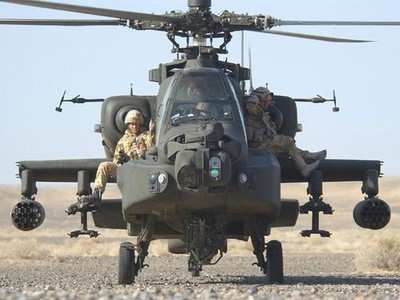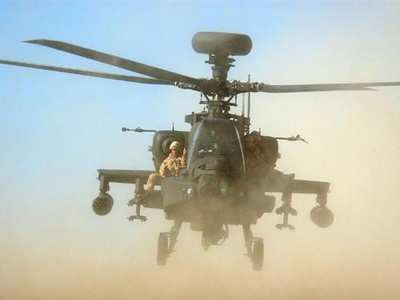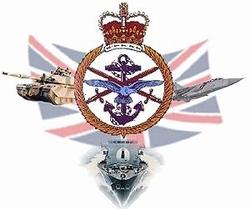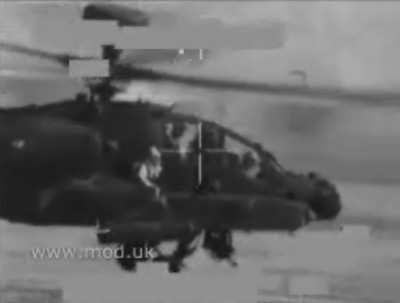Four Strap Onto Apaches To Retrieve Fallen
Comrade
The comrades of a fallen Royal Marine in Afghanistan
strapped themselves to the weapons-support wings of two
Apaches helicopter Monday in a dramatic recovery, seen on video which continues to amaze people
around the world.

Lieutenant Colonel Rory Bruce, UK Task Force spokesman,
described the heroic mission as a "leap into the unknown" to
British newspaper The Independent.
"This is believed to be the first time UK forces have ever tried
this type of rescue mission," said Bruce. "It was an extraordinary
tale of heroism and bravery of our airmen, soldiers and marines who
were all prepared to put themselves back into the line of fire to
rescue a fallen comrade. And it was with great sadness they later
found their brother-in-arms had been killed in action."
He told Sky News later that the soldiers had been under fierce
fire as they approached the fort, but remained determined to not
leave the scene without their colleague. "It was just
extraordinary," he added.
Lance Corporal Mathew Ford of 45 Commando Royal Marines died
Monday, as marines attacked a major Taliban fort to the south of
Garmsir in southern Helmand province.

The idea of hitching a lift with the Apaches came from one of
the helicopter pilots, who argued they could be in and out within
five minutes, said Gary Robinson to the Evening Telegraph and Post.
Robinson was one of the four Royal Marines who participated in the
mission.
 They flew in at low level at about
50 mph to protect the passengers, and touched down inside the fort.
Although they caught the Taliban by surprise, it wasn't long before
they came under intense fire. With other Apaches providing covering
fire from above, the Marines quickly found their fallen
colleague.
They flew in at low level at about
50 mph to protect the passengers, and touched down inside the fort.
Although they caught the Taliban by surprise, it wasn't long before
they came under intense fire. With other Apaches providing covering
fire from above, the Marines quickly found their fallen
colleague.
"All that was going through my head was basically what to do
when we got on the ground and just make sure I knew exactly where I
was going so I could reach Lance Corporal Ford as soon as possible
and get out myself," said Robinson.
He added that when they were asked to volunteer for the mission
not one man hesitated.
"They asked for volunteers and everyone put their hands up," he
said. "The commanding officer picked four of us. "I knew L/Cpl
Ford. I served with him, but in my position any one of my
colleagues would do the same, I'm sure. As far as I'm concerned,
any of my colleagues would have done the same thing if the roles
were reversed.:
"I don't think it was heroic or dangerous in any way," Robinson
added. "At the end of the day it's our job to do things like
this."
The mission developed with an 8:00 am message to the operations
room that one of Z (Zulu) Company was missing, said Colin Hearn,
another rescue mission participant, to The Age.

They located the fallen Marine using an unmanned airborne
vehicle, a reconnaissance plane that plays video of the battlefield
back to the operations room. The discovery was later confirmed by
an Apache flying overhead.
The Apache helicopter is a two-seat aircraft, carrying only a
pilot and gunner, but there are attachments on the wings for
personnel to harness themselves to in emergencies.
(Images courtesy of Royal Navy and UK Ministry of
Defense)
 ANN's Daily Aero-Linx (12.12.25)
ANN's Daily Aero-Linx (12.12.25) ANN's Daily Aero-Term (12.12.25): Land And Hold Short Operations
ANN's Daily Aero-Term (12.12.25): Land And Hold Short Operations ANN FAQ: How Do I Become A News Spy?
ANN FAQ: How Do I Become A News Spy? NTSB Final Report: Cirrus Design Corp SF50
NTSB Final Report: Cirrus Design Corp SF50 Airborne 12.08.25: Samaritans Purse Hijack, FAA Med Relief, China Rocket Fail
Airborne 12.08.25: Samaritans Purse Hijack, FAA Med Relief, China Rocket Fail






